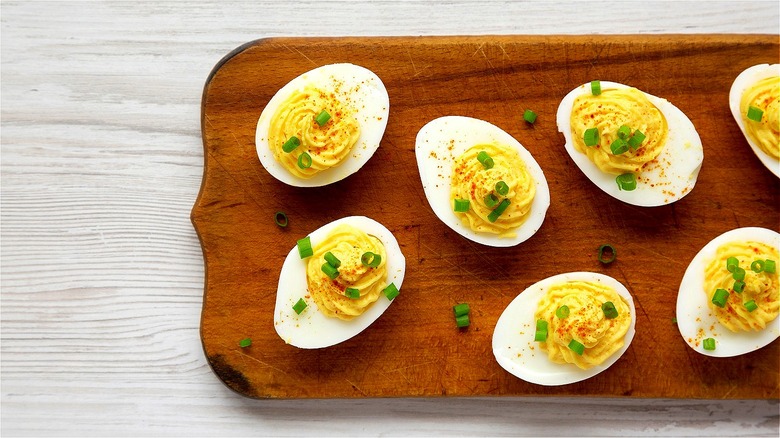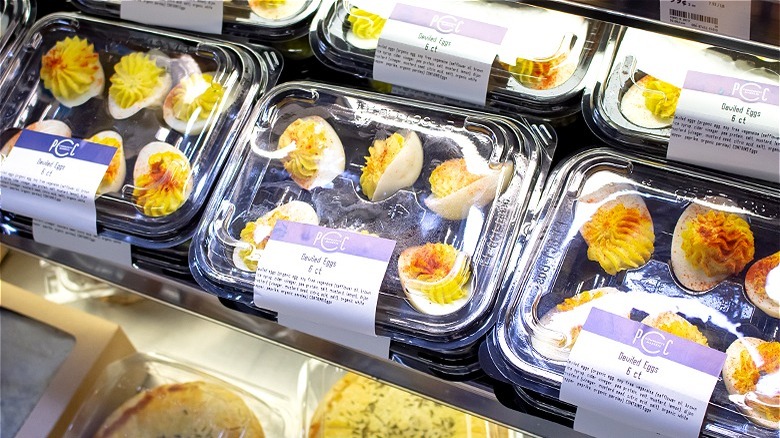Why You Might Want To Avoid Freezing Deviled Eggs
If you're a fan of hors d'oeuvres and have a knack for classic recipes, you're probably guilty of searching the snack table at parties and get-togethers eagerly hoping to spot the tray of deviled eggs. The North Carolina Egg Association claims these deviled or spiced eggs can be traced all the way back to Roman times when eggs were first boiled and dressed in a variety of sauces as a precursor to main meals for special dinner guests. According to Southern Kitchen, the "deviled" part didn't make it into print form until the late 1800s and was known to mean spicy. With the advancements made in automobile technology in the early 1900s, more Americans were able to transport their favorite dishes to events and potlucks, making deviled eggs a viable choice. Since these convenient appetizers have gained traction over the years, what makes them so special?
Southern Kitchen describes that deviled eggs are considered "deviled" because of the unique spice blend used in the seasoning of the creamy yolk-based filling that sits inside those perfectly cooked egg whites. In order to make a great deviled egg, you first need to be able to produce perfect hard-boiled eggs, then craft a delightfully seasoned cream base like the recipe outlined by Food Network. Before getting into the proper storage recommendations and why it's best to avoid freezing this protein-rich snack, what are some popular deviled egg variations?
The boundless variety of deviled eggs
For those interested in making an old-fashioned, party-pleasing deviled egg recipe, first, you need to get the basic ingredients down before veering from any traditional recipe. MasterClass notes that deviled eggs are classically made with hard-boiled eggs, with the egg whites halved and the hardened yolks mixed with mustard, mayonnaise, and sometimes a pickling agent. This mixture is then seasoned with a variety of spices, with paprika and dill as the most common inclusions. Beyond this traditional recipe, what are some other creative ways to prepare this popular recipe?
Good Housekeeping provides over 30 variations for this traditional appetizer ranging from a guacamole-inspired filling to iconic ham and cheese additions. If you really want to get creative with your filling options, Food Network offers a pickled pulled fork variation and even a signature recipe featuring lump crabmeat and Old Bay seasoning. While there doesn't seem to be too many ways you can go wrong when it comes to mixing your favorite savory foods into cooked egg yolks and mayonnaise, you do need to be careful when it comes to storing hard-boiled eggs. Although the USDA advises using hard-boiled eggs within seven days of cooking, does that same rule apply to deviled eggs? Surprisingly, deviled eggs not only have a shorter shelf-life but there are also limits to how they can be frozen.
The right way to store deviled eggs doesn't include your freezer
If you're curious about how long eggs last in the freezer, there are parameters around which parts freeze well. According to the USDA, you may be unsatisfied with the texture of hard-cooked eggs once frozen and thawed. The Healthy claims hard-cooked egg whites specifically change texture in the freezer, leaving you with a less-than-palatable consistency. If you ever have leftovers of that signature deviled egg filling, however, you're somewhat in luck because that part freezes quite well. In order to freeze deviled egg filling, Can You Freeze This? suggests storing the yolk-based mixture in a plastic storage bag and leaving enough air for the contents to expand a bit in the freezer. While you may not be able to store deviled eggs easily in your freezer, you can always store the extras in your refrigerator.
Southern Living outlines the time restraints around deviled egg storage, advising home cooks to consume deviled eggs within three to four days upon preparation. Even though hard-boiled eggs are safe to eat for seven days after cooking, the FDA grants up to four days for egg-based dishes due to the extensive range of added ingredients and the wide range of perishability. However, if you find deviled eggs as delicious as most Americans, don't worry about storing them long-term. Let's see if your platter of blue-crab deviled eggs lasts to the end of your next friends-only get-together.


